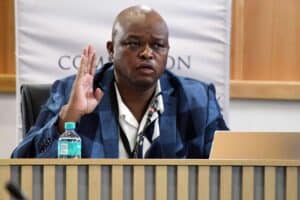Failing to extend the deadline would have significant implications, according to Communications Minister Solly Malatsi.

South Africa’s analogue switch-off process may face another delay due to ongoing challenges, Parliament has heard.
The country is racing to meet the 31 December 2024 deadline to transition from analogue to digital broadcasting, but concerns are mounting.
Civil society groups warn that millions of households still reliant on analogue broadcasting risk losing access to free-to-air television.
The digital migration also poses significant threats to the South African Broadcasting Corporation (SABC) and other free-to-air channels like e.tv, potentially disrupting their operations and viewership.
Analogue switch-off deadline extension
During a briefing to Parliament on Tuesday, Communications and Digital Technologies Minister Solly Malatsi informed members of parliament that the migration process has encountered several challenges.
Malatsi acknowledged the dilemma of moving forward with the current deadline.
“When you look in terms of the progress that has been done, it’s very clear that there will be serious difficulties with proceeding with the date as it is as there are thousands of South Africans who are still dependent on analogue as their source of access to television services,” he said.
The minister highlighted a funding dilemma, noting the lack of financial commitment to maintaining both analogue and digital systems simultaneously if an extension was granted.
ALSO READ: ‘No, you are not going to lose free-to-air TV in SA’ – Department
“Where we are right now, there isn’t a financial provision for this to happen. So we were to say the date should be extended for instance, we then need to get into a conversation about where we find the funding to cover the cost of dual illumination.
“Sentech has already indicated that it is under financial strain to be able to continue with covering this.
“In terms of the Universal [Service and] Access Fund [USAF] which has previously carried this, there hasn’t been any provision made for the next financial year.
“Although with that in mind, the opportunity that is still on the table is an engagement between Usaasa [Universal Service and Access Agency of South Africa] and the [National] Treasury which we as the department can also help fast-track in finding that funding,” Malatsi explained.
Watch the briefing below:
He further emphasised that failing to extend the deadline would have significant implications for broadcasters.
“There has been correspondence from the broadcasters [such as] SABC, eMedia and even the National Association of Broadcasters.
“And if I remember correctly, Icasa [Independent Communications Authority of South Africa] has also written to the ministry expressing their concern with the looming deadline and the implication that it can have.”
Malatsi added that if an extension is granted, the time frame should be carefully considered to avoid revisiting the discussion about the need to review the deadline in the future.
Decoder installations
Tinyiko Ngobeni, Deputy Director-General for ICT Infrastructure Development and Support at the Department of Communications and Digital Technologies noted that despite intensified awareness campaigns about the analogue switch-off deadline, some indigent households have yet to register for set-top box (STB) installations.
Households are required to register for STB installations — commonly referred to as decoders — as part of the migration to digital broadcasting.
The decoders can be either digital terrestrial television (DTT) or direct-to-home (DTH) devices.
READ MORE: SA households urged to buy digital television sets before analogue switch-off
The primary difference lies in their signal distribution methods: DTT uses land-based digital transmitters, while DTH relies on satellites to deliver digital broadcasts.
Ngobeni noted that Sentech has accelerated the installation process, but 469 370 households still need to be connected before the end of December.
While a total of 1.3 million (1 303 503) installations have been successfully completed since the project’s inception, several challenges remain.
The deputy director-general highlighted that incomplete and duplicate physical addresses have made it difficult for installers to locate households,” Ngobeni said.
“It’s also complex when one deals with informal settlements.”
Most analogue transmitters still yet to be switched off
Furthermore, only 21 of South Africa’s 195 analogue television transmitters have been completely switched off as of 31 October.
According to the department, data integrity issues have hindered the pace of decoder installations, delaying progress toward the 90% threshold required to secure broadcaster authorisation for the switch-off.
Once the 90% threshold is reached, installations for the remaining households will continue.
Ngobeni also revealed that government has spent R1.23 billion on dual illumination since 2014.
To address the shortfall for the 2024/2025 financial year, the department and Usaasa have requested Treasury approval to reprioritise R140 million from USAF funds.
READ MORE: Communication department speeds up decoder installations ahead of analogue switch-off
But the deputy director-general emphasised that the analogue TV network was outdated, as equipment for its operation was no longer being manufactured.
“If the equipment fails, there are no spares and that also poses a risk if this network gets to be prolonged.
“Additionally, the costs of operating an analogue network [are] quite high for Sentech because the energy consumption of this analogue equipment is not efficient.
Meanwhile, Malatsi stressed that an extension was required.
“No rational individual would argue against the fact that everything points out that the soil is fertile for extension.”
Support Local Journalism
Add The Citizen as a Preferred Source on Google and follow us on Google News to see more of our trusted reporting in Google News and Top Stories.






